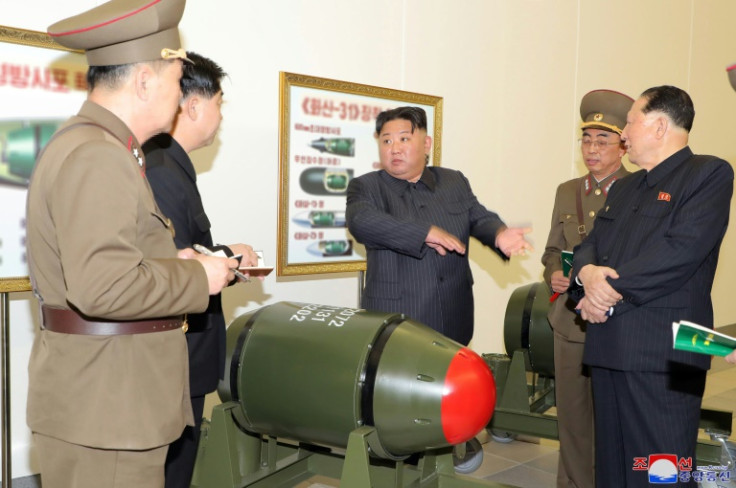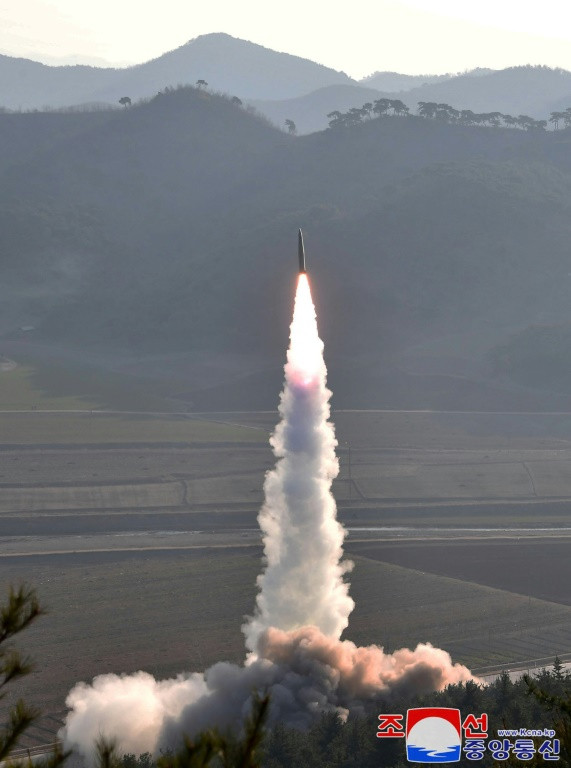N. Korea's Kim Calls For Ramping Up Production Of 'Weapon-grade Nuclear Material'

North Korean leader Kim Jong Un called for his country to expand production of "weapon-grade nuclear materials" and build more powerful weapons, state media reported Tuesday.
Kim's latest threat, a doubling-down on an earlier promise to "exponentially" ramp up nuke production, came as a US Navy carrier strike group arrived in South Korea on Tuesday.
Kim was briefed by officials from the country's nuclear weapons institute, the official Korean Central News Agency reported, and said North Korea should prepare to use the weapons "anytime and anywhere".
He called on officials to expand "the production of weapon-grade nuclear materials" needed for an "exponential" increase in the country's arsenal.
Kim also "put spurs to continuing to produce powerful nuclear weapons" that he said would strike fear into the country's enemies, KCNA added.
Photos carried by the official Rodong Sinmun newspaper showed Kim, surrounded by uniformed officers, inspecting a row of purported tactical nuclear warheads identified as the "Hwasan-31" -- which means volcano in Korean.
The compact green warheads can be mounted onto different types of missiles, according to diagrams seen on the wall in the background.
North Korea last year declared itself an "irreversible" nuclear power, and Kim recently called for an "exponential" increase in weapons production, including tactical nukes.
North Korean state media released a flurry of nuclear-related reports Tuesday, an indication the country was building up to a seventh nuclear test, according to analysts.
"North Korea unveiled a significantly miniaturised tactical nuclear warhead this time, and many are questioning whether it can really explode," said Cheong Seong-chang, a researcher at the Sejong Institute.
"The possibility that North Korea will carry out a seventh nuclear test with these tactical nuclear warheads as a next step has increased," he told AFP.
Pyongyang has got into a pattern of "tit for tat" missile launches and tests to counter US and South Korean military exercises, which represents a huge -- and unsustainable -- financial outlay for the impoverished country, one expert said.
"North Korea warned of overwhelming response against each South Korea-US joint training, but looking at the number of missiles fired, they can't continue this forever," Park Won-gon, a professor at Ewha University in Seoul, told AFP.
"If so, the seventh nuclear test will mark some kind of an end, they will declare themselves a nuclear power, and they will turn to negotiating with the United States," he said.
The North Korean military also conducted a firing drill on Monday, simulating a nuclear attack using tactical ballistic missiles, KCNA said in a separate report, part of a record-breaking streak of tests.
"North Korea is sending a very coherent message. They are fighting for recognition as a perfect nuclear power," Park added.
In addition to increasing its nuclear stockpile, the country is seeking to diversify its delivery mechanisms for the weapons.
On Tuesday, it claimed to have conducted a second successful test of a new underwater nuclear attack drone.
The first test of the Haeil -- which means tsunami in Korean -- was allegedly carried out last week in what Pyongyang said was a response to recent US-South Korea military exercises, the largest in five years.
Seoul has cast doubt on the claim, with the country's military saying it was "weighing the possibility" the test had been exaggerated or even "fabricated".
There were some indications "North Korea is developing unmanned submarines, but it is evaluated that they are still in the early stages," the Joint Chiefs of Staff said.
But on Tuesday, Pyongyang said the Haeil had manoeuvred underwater "for 41 hours and 27 minutes tracking a simulated route spanning 600 kilometres" before destroying a target off North Hamgyong province early Monday, according to another KCNA report.
The test "proved all strategic qualifications as well as safety and reliability in the weapons system", KCNA said.
Russia has also reportedly developed a similar weapon -- the nuclear-capable Poseidon torpedo -- but mastering the complex technology required for such weaponry might yet be beyond North Korea, experts have said.

© Copyright AFP 2025. All rights reserved.





















